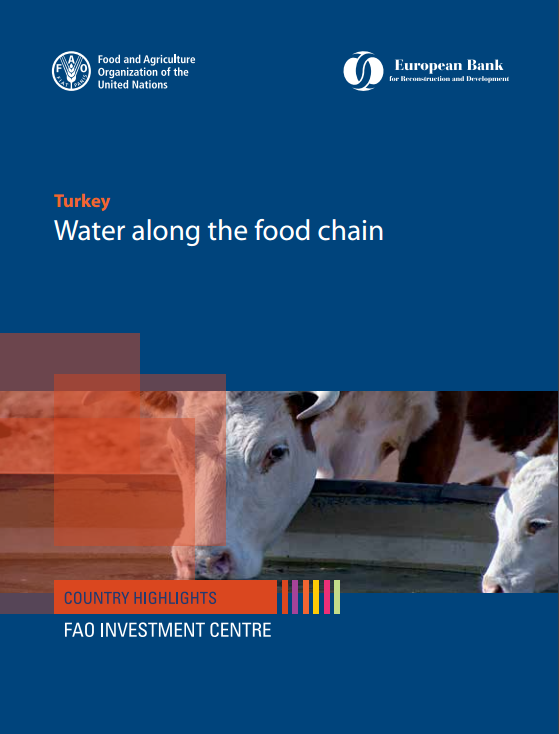Assessing water use efficiency in Turkey’s red meat sector

As a leading global agricultural producer, Turkey has a key role in feeding the world, and its agrifood sector will be of tremendous importance in the coming decades – that is, if water scarcity does not interfere.
By 2023, agriculture is expected to account for 64 percent of Turkey’s total national water consumption. If the country is to maintain its agrifood edge, it must ensure that the sector’s water requirements can be met sustainably.
Turkey: Water along the food chain, a newly published study by FAO and the European Bank for Reconstruction and Development (EBRD), looks at current and projected water use trends in the agriculture sector, as well as institutional and policy issues.
In particular, it analyses water efficiency in the country’s growing red meat sector and assesses the sector’s competitiveness vis-à-vis global red meat production leaders.
Important agrifood player
Turkey ranks eighth in food production worldwide, just after Argentina and ahead of France. Unprocessed crop products account for much of that, but the country also has a burgeoning food processing industry.
Turkey is already a major exporter of agricultural and food products to the European Union, as well as an important trading partner to countries in the Middle East and North Africa (MENA), operating as a food hub for the water-scarce region. The country has unique potential to provide regional markets with premium products such as halal meat.
“Ensuring that Turkey’s agrifood economy continues to grow and prosper is not just a national concern,” said Nuno Santos, an FAO economist and one of the study’s co-authors. “Turkish food production is important for a number of Middle Eastern and North African countries.”
Risks to water supplies
Though the country is not yet severely water-stressed, the situation could deteriorate with overuse and wastage of water, climate change, water pollution and seawater intrusion.
“Regional water supply problems are emerging in Turkey” said Professor Sebastian Hess, an agricultural economist from Christian-Albrechts University in Kiel and another of the study’s authors “and the outlook over time is worrying, especially for the agricultural economy.”
Another challenge is limited water governance. Policies for water pricing, for example, do not encourage efficiency or cost recovery, especially for irrigation. Groundwater resources are widely exploited across the country, and the use of unregistered wells is common – all of which threaten long-term water availability.
A closer look: the red meat sector
To meet Turkey’s growing demand for red meat, the Government has made self-sufficiency in red meat a national policy priority, providing incentives to producers to encourage production. However, such incentives and meat production can be at odds with sustainable water management.
Maize grown for animal feed is the largest water-consuming crop in the country, while water consumption levels for slaughtering and processing are high by global standards. Domestic beef is expensive in part because of high production costs, making Turkish products less competitive.
According to the study, there is a need to align the goals for the red meat sector with policies that promote sustainable water use.
Rather than providing producers with incentives to irrigate maize, for example, the Government should encourage “water-smart” agricultural development – from improving animal genetics toward high-productivity breeds, to importing roughage or producing it domestically from crops that demand less water, in addition to improving irrigation infrastructure and irrigation practices. The Government can also ensure appropriate pricing of tap water and groundwater usage from company-owned wells.
New opportunities
Producing more with less is a daunting task, but sustainable water development projects in Turkey can provide new opportunities for growth while contributing to the longevity of agrifood production in the country.
“Action to ensure Turkish water supplies in the medium to long term is not an answer to food security concerns, but can bring major benefits to the country,” said Nadia Petkova, Regional Head for Turkey and Caucasus, Agribusiness, EBRD. “Consumers would have access to more affordable and better quality food, producers could lower business costs and the national economy could profit from more high-value exports.”
The study is the result of a multi-country FAO/EBRD analysis on water efficiency in specific value chains in Turkey, Jordan, Ukraine and the Kyrgyz Republic.
